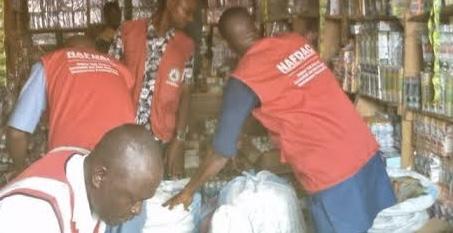According to information released by the National Agency for Food and Drug Administration and Control (NAFDAC), recent enforcement raids targeting illegal drug sales in three major cities—Lagos, Onitsha, and Aba—generated N2.5 billion in fines.
Prof. Mojisola Adeyeye, the agency’s director general, revealed this on Wednesday when he appeared before the House of Representatives’ Committee on Food and Drug Administration and Control.
“It was collected as penalties from vendors who were caught selling counterfeit and substandard pharmaceutical products in open markets across the country,” she said.
She explained that all of the money was transferred to the official NAFDAC account.
While N159 million had to be borrowed from a donor-funded grant to support the endeavor, N996 million of the N2.537 billion earned was utilized to carry out the enforcement actions.
The agency’s remaining balance was roughly N206 million after an extra N1.175 billion was spent on regulatory expenses.
“The operation, which involved the deployment of over 1,300 security personnel, uncovered a wide array of violations, including the sale of expired drugs, unregistered medicines, and poor storage practices,” Prof. Adeyeye added.
She claimed, “The charges were paid straight into NAFDAC’s account.” “We invested close to N1 billion in activities in Aba, Onitsha, and Lagos. We had to borrow N159 million from a donor grant since we didn’t have enough funds.
Approximately N207 million was left over after N1.175 billion was spent on regulatory actions.
She mentioned that some dealers were discovered to be selling dangerous narcotics and prohibited medications like tramadol.
She emphasized that the fines were essential for upholding standards and were not punitive.
To promote compliance, the default penalty for breaking Good Distribution and Storage Practices (GDSP) was reduced to N500,000 in many instances.
Adeyeye bemoaned the Federal Government’s revenue restrictions, which have seriously weakened the agency’s ability to maintain comparable enforcement activities.
She clarified that while NAFDAC had N19 billion in its account at the end of 2023, only N4.5 billion was ultimately released because N9 billion had been taken out before the agency could access it.
Adeyeye spoke on NAFDAC’s 2024 operation in Kano, describing it as a special court-ordered intervention that was very different from the enforcement measures in southern cities.
The raid, she added, came after a Federal High Court ruling on February 16, 2024, which ordered open drug market vendors to move to the recently constructed Kanawa Pharmaceutical Centre, a Coordinated Wholesale Centre (CWC).
The traders objected. Violent threats were issued. We replied by using heavier padlocks to secure their stores once they locked them, she claimed.
“They had to consent to move to the regulated CWC before they could reopen.”
Due to the legal mandate and the unstable security environment, no fines or administrative charges were collected in Kano, in contrast to the southern operations.
Following the traders’ relocation, post-marketing surveillance was carried out.
She remembered that around the beginning of January 2024, “our accounts had just been frozen and reopened with a zero balance.”
“We had to relocate more than 1,300 stores to the regulated facility in accordance with the court’s order, despite the financial strain.”
Read Also: Port Harcourt Refinery Rehabilitation Nears Completion, NNPC Assures
Noting that it was the only state that had complied with the presidential direction long before her term, she praised the Kano State government for creating the CWC.
In contrast, NAFDAC had to examine and punish violators in Lagos, Onitsha, and Aba because these cities lacked CWCs.
Adeyeye responded to parliamentarians’ worries about what they saw as preferential treatment of Kano traders by stating that the agency’s actions were motivated by the court’s haste and the danger to its employees.
“More inspections or charges might have been ideal in hindsight,” she remarked. But things were too tense; one of our lawyers was almost attacked.
Safety and adherence to the court’s ruling had to come first.
Adeniji Nma, the Director of Finance and Accounts for NAFDAC, also informed the committee, indicating that NAFDAC may now automatically remove a sizable amount of its earnings because the Office of the Accountant-General of the Federation (OAGF) reclassified the organization as a revenue-generating agency.
“Since 2024, half of all payments made to NAFDAC have been withheld and transferred to the federal treasury due to an order from the OAGF,” she stated.
This deduction rose to 75% by 2025. Because the majority of our payments are service-based and directly related to inspections and other activities, this makes it very difficult for us to finance our operations.
Following the presentation, committee member Hon. Emeka Idu requested a thorough, site-by-site analysis of the money obtained from the enforcement operations.
The committee’s chairperson, Hon. Regina Akume, deemed the presentation lacking and instructed the agency to submit a comprehensive report detailing all income received and distributed, including precise numbers from every location.
“A comprehensive picture of the inflows and expenditures is still lacking,” she stated. “Go back, clean up your records, and then return with a proper breakdown.”
Join Television Nigerian Whatsapp Now
Join Television Nigerian Facebook Now
Join Television Nigerian Twitter Now
Join Television Nigerian YouTUbe Now





